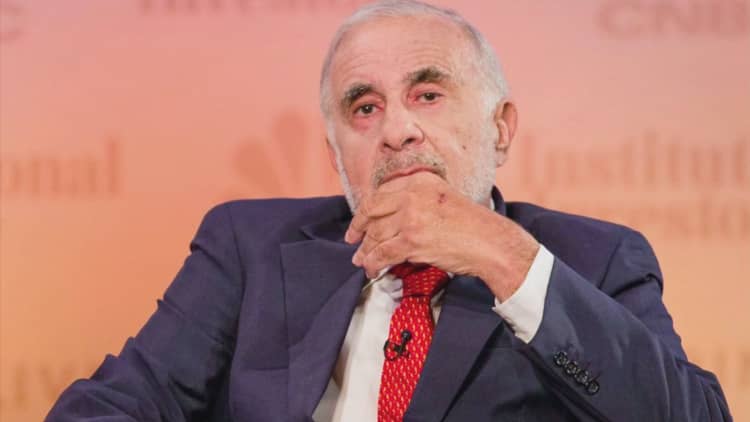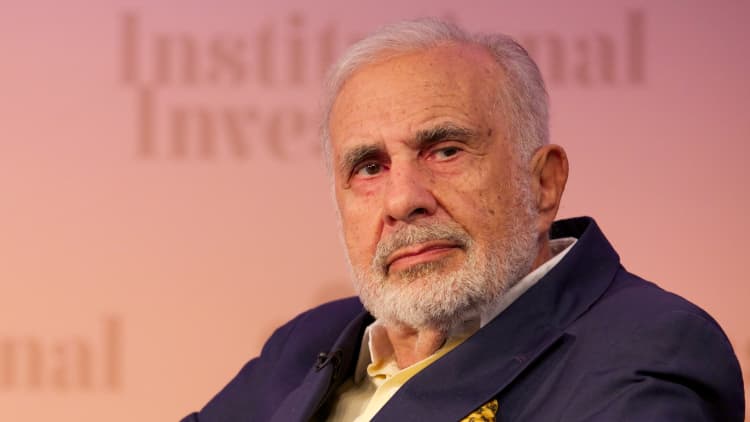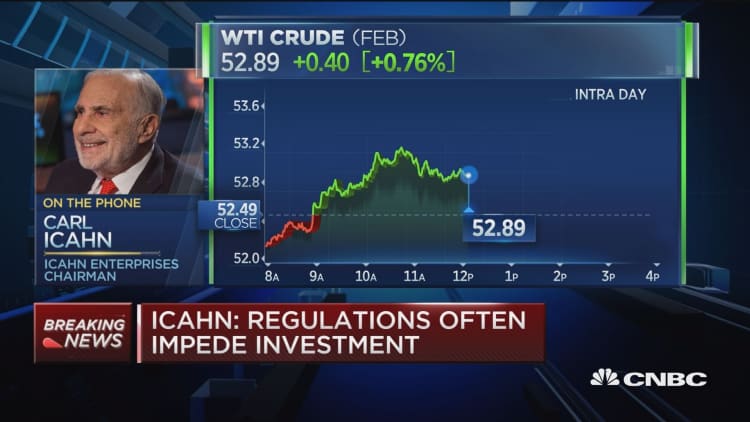
Democratic lawmakers on Tuesday asked regulators to investigate Carl Icahn, months after ethics experts warned the billionaire investor would likely face scrutiny over his role as a White House advisor.
That prediction appeared to come to pass as eight Democratic senators called on the Securities and Exchange Commission, the Commodity Futures Trading Commission and the Environmental Protection Agency to probe whether Icahn engaged in insider trading, market manipulation or other violations.
The complaint stems from Icahn's proposal in February to make changes to the market for trading biofuel refining credits that would benefit certain refiners, including CVR Energy, in which Icahn holds a controlling stake, Reuters reported Tuesday.
CVR built a large short position in renewable fuel credits, or RINs, positioning the refiner to profit if the price of the credits fell, according to Reuters. Prices dropped shortly after Icahn made his proposal.
Quoting from an earlier Reuters story, the lawmakers noted in a letter to the agencies that "Mr. Icahn 'made a massive bet in 2016' that the price of the renewable fuel credits would drop. He then — as an unpaid advisor to President Trump — recommended personnel and policies that
To be sure, a probe has not yet been launched and it is uncertain whether the agencies will take up the case. Icahn has long maintained that he did not accept the role advising President Donald Trump on regulatory policy to reap personal gain.
But former White House ethics lawyers told CNBC when Icahn was tapped in December that the billionaire's appointment to the informal role, given his stake in CVR Energy, represents a conflict of interest and could put him at risk of violating conflicts laws.
If Icahn's advice in his capacity as special advisor on regulation contributed to such a repeal, he would have inherently aided in removing a disadvantage for CVR. Repeal of the regulation would potentially boost CVR's stock price and enrich Icahn.
Shares of CVR Energy rose 11.5 percent the day after Trump named Icahn to the role. The stock is up about 4 percent since then. Icahn Associates holds 82 percent of CVR Energy's outstanding shares, according to FactSet data.

At the time, the Trump transition team said Icahn "will be advising the President in his individual capacity and will not be serving as a federal employee or a Special Government Employee and will not have any specific duties."
After the announcement, Norman Eisen, former chief ethics lawyer to President Barack Obama, told CNBC that Icahn should beware, because the situation may pose a violation of conflict of interest and other laws, some of which could carry a criminal penalty. He said Icahn's duties may go beyond informal advising, given that he has a formal title as
"It appears that he may end up as a de facto special government employee. As such, he would be subject to the conflicts rules, including under 18 USC 208," Eisen told CNBC, referring to a law that restricts people with a financial interest from advising the president.
"If so, that would make him potentially criminally liable if he worked on a repeal of the ethanol mandate that would boost CVR's stock price and enrich him. Of course, that's a lot of ifs," said Eisen, now a fellow at the Brookings Institution.
In a statement to CNBC in response to this point, Jesse Lynn, general counsel at Icahn Enterprises, said: "Mr. Icahn is well aware of his obligations under the law generally and with respect to 18 U.S.C. 208 specifically. He will follow the law as he always has."
He reiterated the Trump team's message that "unlike a government employee, [Icahn] will have no official role or duties." He added that Icahn will not be in a position to set policy, but will instead offer suggestions.
Eisen said the press release announcing Icahn's appointment did not provide sufficient details about what Icahn "will and will not do, and how he will avoid tripping into" the role of
Richard Painter, a former chief ethics lawyer for President George W. Bush and longtime critic of Trump, told CNBC in December that it would be a "huge conflict" if Icahn advised Trump on the ethanol mandate. In an email to CNBC after the hiring, Painter noted that the Trump transition team said Icahn "is not a government employee (they may be wrong on this if he acts like one) so it looks like they are saying the rules won't apply to him."
The eight senators echoed those comments on Tuesday in their letter to the three agencies.
"These actions, and the massive profit earned by Mr.

Icahn has long been a critic of the Renewable Fuel Standard, which requires refiners to blend ethanol and other biofuels with gasoline.
In an interview on CNBC's "Fast Money: Halftime Report" in December Icahn said the Environmental Protection Agency should immediately revoke part of the rule that requires refiners that cannot blend ethanol into gasoline to buy credits instead. In February, he suggested shifting the responsibility for mixing biofuels into gasoline from refiners to blenders.
Large refiners that operate gas stations have an advantage in this system because they can blend the gasoline and send it to their pumps to be sold to consumers. That means they have to buy fewer RINs.
But smaller merchant refiners like CVR Energy do not have blending operations and instead sell gasoline in bulk to traders. As a result, they have to buy RINs to comply with the ethanol mandate.
Icahn has said he opposes the regulation because it stresses refiners' finances and prevents them from investing in their facilities. He has warned that the cost burdens associated with RINs could push some refiners into bankruptcy, which would lead to higher gasoline prices.
That could have ripple effects that "would absolutely wreck America's economy," he wrote in a Wall Street Journal editorial.


